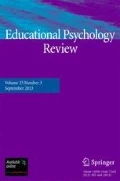Abstract
The measurement of online self-regulation processes is a very important issue and in this rejoinder to Ainley and Patrick (this issue) I am arguing that including measures of metacognitive experiences, in conjunction with measures of other affective experiences, in various phases of task processing can increase the reliability and validity of online measures and our understanding of the self-regulation process. Furthermore, behavioral and performance measures as well as thinking aloud protocols can enrich not only the reliability and validity of our measures but also our awareness of the factors involved in the formation of the various facets of subjective experiences, be it affective or metacognitive.
Similar content being viewed by others
Notes
Actually, metacognitive knowledge is functioning at this general, macro-level, unlike metacognitive experiences that function at the micro-level.
References
Ainley, M., Hidi, S., & Berndorff, D. (2002). Interest, learning and psychological processes that mediate their relationship. Journal of Educational Psychology, 94(3), 545–561.
Efklides, A. (2001). Metacognitive experiences in problem solving: Metacognition, motivation, and self-regulation. In A. Efklides, J. Kuhl, & R. M. Sorrentino (Eds.), Trends and prospects in motivation research (pp. 297–323). Dordrecht, The Netherlands: Kluwer.
Efklides, A. (2002a). The systemic nature of metacognitive experiences: Feelings, judgments, and their interrelations. In M. Izaute, P. Chambres, & P.-J. Marescaux (Eds.), Metacognition: Process, function, and use (pp. 19–34). Dordrecht, The Netherlands: Kluwer.
Efklides, A. (2002b). Feelings as subjective evaluations of cognitive processing. How reliable are they? Psychology: The Journal of the Hellenic Psychological Society, 9, 163–184.
Efklides, A., & Petkaki, C. (2005). Effects of mood on students’ metacognitive experiences. Learning and Instruction, 15, 415–431.
Efklides, A., & Tsiora, A. (2002). Metacognitive experiences, self-concept, and self-regulation. Psychologia: An International Journal of Psychology in the Orient, 45, 221–235.
Flavell, J. H. (1979). Metacognition and cognitive monitoring: A new area of cognitive developmental inquiry. American Psychologist, 34, 906–911.
Iiskala, T., Vauras, M., & Lehtinen, E. (2004). Socially-shared metacognition in peer learning? Hellenic Journal of Psychology, 1, 147–178.
Iran-Nejad (1987). Cognitive and affective causes of interest and liking. Journal of Educational Psychology, 79, 120–130.
Kuhl, J., & Fuhrmann, A. (1998). Decomposing self-regulation and self-control: The volitional component inventory. In J. Heckhausen & C. S. Dweck (Eds.), Motivation and self-regulation across life span (pp. 15–49). Cambridge, UK: Cambridge University Press.
Nelson, T. O. (1996). Consciousness and metacognition. American Psychologist, 51, 102–116.
Pekrun, R., Goetz, T., Titz, W., & Perry, R. (2002). Academic emotions in students' self-regulated learning and achievement: A program of qualitative and quantitative research. Educational Psychologist, 37, 91–105.
Schraw, G., & Impara, J. (Eds.) (2000). Issues in the measurement of metacognition. Lincoln, Nebraska: Buros Institute of Mental Measurements, University of Nebraska—Lincoln.
Author information
Authors and Affiliations
Corresponding author
Rights and permissions
About this article
Cite this article
Efklides, A. Metacognitive Experiences: The Missing Link in the Self-Regulated Learning Process. Educ Psychol Rev 18, 287–291 (2006). https://doi.org/10.1007/s10648-006-9021-4
Published:
Issue Date:
DOI: https://doi.org/10.1007/s10648-006-9021-4



